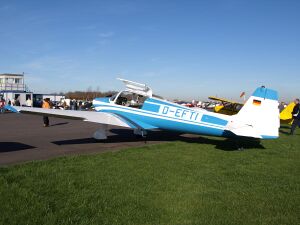Engineering:Bölkow Bo 207
| Bo 207 | |
|---|---|

| |
| Role | Civil utility aircraft |
| National origin | West Germany |
| Manufacturer | Bölkow |
| First flight | 10 December 1960[1] |
| Produced | 1961-1963 |
| Number built | 92 |
The Bölkow Bo 207 was a four-seat light aircraft built in West Germany in the early 1960s, a development of the Klemm Kl 107 built during World War II.
Design and development
The Bo 207 is a wood construction, single-engined, cantilever low-wing cabin monoplane with a conventional landing gear with a tail wheel. The aircraft is powered by a Lycoming O-360 four-cylinder, direct-drive, horizontally opposed, air-cooled, piston engine.
Bölkow had built the two and three-seat Kl 107 and developed a four-seat variant, at first designated the Kl 107D.[2] The low-wing cabin monoplane had a re-designed cockpit and canopy and a larger tail.[2] The two prototype Kl 107Ds were built at Nabern and the first flew on 10 October 1960.[2] With the change of name of the company to Bolkow and the move to new factory at Laupheim production of the new variant was started at the new factory.[2] In May 1961 the design was re-designated the Bolkow F.207 but by July 1961 it was re-designated again as the Bolkow BO 207.[2]
The first of 90 production aircraft built at Laupheim was flown on 24 May 1961 and production continued until 1963.[2][3] A number of aircraft remained unsold and the last aircraft although built in 1963 did not fly until 1 April 1966.[3] One aircraft was built with tricycle landing gear, and designated BO 217B or sometimes known as the BO 214 but it was fitted with a conventional landing gear before it was sold.[3]
Variants
- Kl 107D
- Two prototypes later re-designated F.207 and then BO 207. V-1 prototype modified as the BO 207T.[2]
- BO 207
- Production aircraft, 90 built.[2][3]
- BO 207B
- One 207 temporary modified with a tricycle landing gear, also known as the BO 214.[3]
- BO 207T
- Prototype V-1 modified as a trainer with reduced weight.[2]
Specifications (Bo 207)
Data from Jane's All The World's Aircraft 1965-66.[4]
General characteristics
- Crew: 1
- Capacity: 3 passengers
- Length: 8.30 m (27 ft 3 in)
- Wingspan: 10.81 m (35 ft 6 in)
- Height: 2.25 m (7 ft 5 in)
- Wing area: 15.40 m2 (165.8 sq ft)
- Aspect ratio: 7.6:1
- Airfoil: NACA 23018 at root, NACA 23012 at tip
- Empty weight: 715 kg (1,576 lb)
- Max takeoff weight: 1,200 kg (2,646 lb)
- Fuel capacity: 190 L (50 US gal; 42 imp gal)
- Powerplant: 1 × Lycoming O-360-A1A air-cooled flat-four engine, 130 kW (180 hp)
Performance
- Maximum speed: 255 km/h (158 mph, 138 kn) at sea level
- Cruise speed: 200 km/h (120 mph, 110 kn) (econ cruise)
- Stall speed: 82 km/h (51 mph, 44 kn)
- Never exceed speed: 340 km/h (210 mph, 180 kn)
- Range: 1,250 km (780 mi, 670 nmi)
- Service ceiling: 4,300 m (14,100 ft)
- Rate of climb: 3.6 m/s (700 ft/min)
- Takeoff distance to 15 m (50 ft): 480 m (1,570 ft)
- Landing distance from 15 m (50 ft): 460 m (1,510 ft)
See also
Related development
References
- ↑ Taylor 1965, p.66.
- ↑ 2.0 2.1 2.2 2.3 2.4 2.5 2.6 2.7 2.8 Gerhardt, Peter (1990). "The Bolkow Lightplanes Part Two". Archive (Air-Britain) 1990 (2): 49–50. ISSN 0262-4923.
- ↑ 3.0 3.1 3.2 3.3 3.4 Gerhardt, Peter (1990). "The Bolkow Lightplanes Part Three". Archive (Air-Britain) 1990 (3): 73–76. ISSN 0262-4923.
- ↑ Taylor 1965, pp. 66–67.
- Taylor, John W. R. (1965). Jane's All The World's Aircraft 1965-66. London: Samson Low, Marston.
- Taylor, Michael J. H. (1989). Jane's Encyclopedia of Aviation. London: Studio Editions. pp. 192.
- Simpson, R. W. (1995). Airlife's General Aviation. Shrewsbury: Airlife Publishing. pp. 85.
 |

